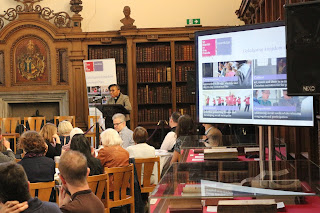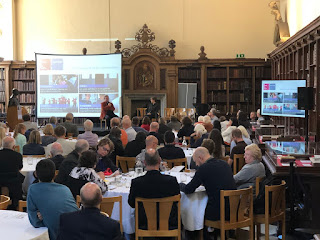HeartEdge is proud to partner the CEEP Network in their 2021 Digital Annual Conference 'For a Time Such as This: The Church as Witness', March 2 - 5, 2021. We're going to be there with lots of
@HeartEdge_ info, a Gathering of US partners and Sam Wells and Azariah France-Williams in conversation.
Information and registration at https://www.ceepnetwork.org/2021-conference-online/.
From COVID-19 to economic anxiety to the racial reckoning taking place across our Church, in our nation and around the world, we are witnessing change, challenge, and opportunity unlike any other time in our lives. In this historic and defining time, the CEEP Network is excited to announce we will gather on-line to bear witness together at the 2021 Annual Conference.
The CEEP Network is honored to present the most influential thought leaders in the Church today to share their wisdom and insights with you:
- The Most Reverend Michael Curry, Presiding Bishop, The Episcopal Church: The Most Reverend Michael Curry was installed the 27th Presiding Bishop and Primate of The Episcopal Church on November 1, 2015. He is the Chief Pastor and serves as President and Chief Executive Officer and is the Chair of the Executive Council of The Episcopal Church.
- Carey Kelly, Consultant and Former CEEP Network Board President: Cary Kelly has spent the majority of her career to working with non-profit organizations and churches. She focuses on helping these organizations effectively promote their mission through bold visioning and board governance practices. She also has served as a certified leadership coach to priests and executives with a focus on building self-mastery and effective leadership practices. Cary has served as consultant and board president for the Consortium of Endowed Episcopal Parishes and chaired their search for a new executive director.
- Catherine Meeks, PhD, Executive Director, Absalom Jones Center for Racial Healing: Dr. Catherine Meeks is executive director of the Absalom Jones Center for Racial Healing. Prior to the center’s opening, she chaired its precursor, Beloved Community: Commission for Dismantling Racism for the Episcopal Diocese of Atlanta.
- Darren Walker, President, The Ford Foundation: Darren Walker is president of the Ford Foundation, a $13 billion international social justice philanthropy. His is co-founder and chair of the President’s Council on Disability Inclusion in Philanthropy.
- The Reverend Kathleen Walker, Missioner for Black Ministries, Diocese of North Carolina: Reverend Kathleen (Kathy) Walker joined the bishop’s staff in February 2020 to focus on the contributions and vitality of historically Black congregations by helping to weave their diversity into a closer bond of inclusion with other parishes and with the diocese. The goal is to ensure all predominantly Black congregations have the best opportunity to make the fullest use possible of the resources of their parishes, partnerships, and diocese.
- The Most Reverend and Right Honorable Justin Welby, Archbishop of Canterbury: The Most Reverend and Right Honorable Justin Welby became the Archbishop of Canterbury in 2013. He was previously Bishop of Durham, Dean of Liverpool Cathedral, and a Canon of Coventry Cathedral, where he worked extensively in the field of reconciliation. Archbishop Welby has three main priorities for his ministry — Evangelism and Witness, Prayer and the Renewal of Religious life, and Reconciliation. He is a member of the High-Level Advisory Board on Mediation for the United Nations. He is the author of Reimagining Britain and Dethroning Mammon, both published by Bloomsbury.
- The Reverend Dr. Sam Wells, Vicar, St. Martin-in-the-Fields: Reverend Dr. Sam Wells has been Vicar of St Martin-in-the-Fields since 2012. He has served as a parish priest for 20 years — ten of those in urban priority areas. He also spent seven years in North Carolina, where he was Dean of Duke University Chapel. Dr. Wells is a Visiting Professor of Christian Ethics at King’s College. He is a regular contributor to Thought for the Day on BBC Radio 4’s Today program. He has published 35 books, including works on Christian ethics, mission, ministry, scripture, liturgy, and preaching.
- The Reverend Azariah France-Williams: Azariah France-Williams has over a decade of experience within the Church of England and has been a pioneer priest at Ascension Church in Manchester since the summer of 2020. The role is strongly supported by the HeartEdge network and is a new initiative to stimulate the work and worship of the church, embedded within its community.
----------------------------------------------------------------------------------------------------------
Buddy Miller - There's A Higher Power.















































